 W
WThe Analects, also known as the Analects of Confucius, is an ancient Chinese book composed of a large collection of sayings and ideas attributed to the Chinese philosopher Confucius and his contemporaries, traditionally believed to have been compiled and written by Confucius's followers. It is believed to have been written during the Warring States period, and it achieved its final form during the mid-Han dynasty. By the early Han dynasty the Analects was considered merely a "commentary" on the Five Classics, but the status of the Analects grew to be one of the central texts of Confucianism by the end of that dynasty.
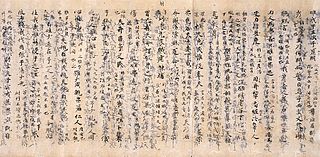 W
WThe Book of Documents or Classic of History, also known as the Shangshu, is one of the Five Classics of ancient Chinese literature. It is a collection of rhetorical prose attributed to figures of ancient China, and served as the foundation of Chinese political philosophy for over 2,000 years.
 W
WThe Book of Rites, also known as the Liji, is a collection of texts describing the social forms, administration, and ceremonial rites of the Zhou dynasty as they were understood in the Warring States and the early Han periods. The Book of Rites, along with the Rites of Zhou (Zhōulǐ) and the Book of Etiquette and Rites (Yílǐ), which are together known as the "Three Li (Sānlǐ)," constitute the ritual (lǐ) section of the Five Classics which lay at the core of the traditional Confucian canon. As a core text of the Confucian canon, it is also known as the Classic of Rites or Lijing, which some scholars believe was the original title before it was changed by Dai Sheng.
 W
WThe Classic of Filial Piety, also known by its Chinese name as the Xiaojing, is a Confucian classic treatise giving advice on filial piety: that is, how to behave towards a senior such as a father, an elder brother, or a ruler.
 W
WThe Classic of Poetry, also Shijing or Shih-ching, translated variously as the Book of Songs, Book of Odes or simply known as the Odes or Poetry, is the oldest existing collection of Chinese poetry, comprising 305 works dating from the 11th to 7th centuries BC. It is one of the "Five Classics" traditionally said to have been compiled by Confucius, and has been studied and memorized by scholars in China and neighboring countries over two millennia. It is also a rich source of chengyu that are still a part of learned discourse and even everyday language in modern Chinese. Since the Qing dynasty, its rhyme patterns have also been analysed in the study of Old Chinese phonology.
 W
WThe Doctrine of the Mean or Zhongyong is both a doctrine of Confucianism and also the title of one of the Four Books of Confucian philosophy. The text is attributed to Zisi, the only grandson of Confucius. It was published as a chapter in the Classic of Rites.
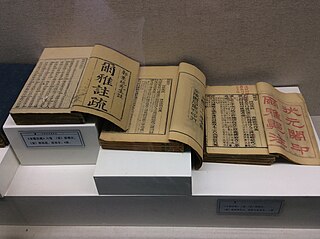 W
WThe Erya or Erh-ya is the first surviving Chinese dictionary. Bernhard Karlgren concluded that "the major part of its glosses must reasonably date from the 3rd century BC."
 W
WThe Han Kitab was a collection of Chinese Islamic texts, written by Chinese Muslims, which synthesized Islam and Confucianism. It was written in the early 18th century during the Qing dynasty. Its name is similarly synthesised: 'Han' is the Chinese word for Chinese, and 'kitab' means book in Arabic. Liu Zhi wrote his Han Kitab in Nanjing in the early 18th century. The works of Wu Zunqie, Zhang Zhong, and Wang Daiyu were also included in the Han Kitab.
 W
WThe Kongzi Jiayu, translated as The School Sayings of Confucius or Family Sayings of Confucius, is a collection of sayings of Confucius (Kongzi), written as a supplement to the Analects (Lunyu).
 W
WThe Mencius is a collection of conversations, anecdotes, and series of genuine and imagined interviews by the Confucian philosopher, Mencius. The book explores Mencius’ views on the topics of moral and political philosophy, that are often posed as a dialogue to the ideas presented by Confucianism. The interviews and conversations are depicted as being either between Mencius and the various rulers of the Warring States period, or with his students and other contemporaries. The book documents Mencius’ travel across the states, and his philosophical conversations and debates with those he meets on his journey. A number of scholars suggest that the text was not written by Mencius himself, but rather by his disciples. The text is believed to have been written during the late 4th century BC.
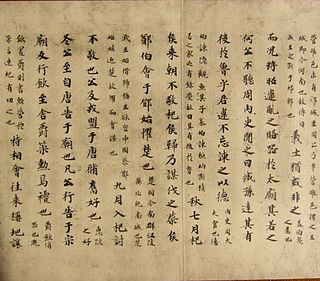 W
WThe Spring and Autumn Annals or Chunqiu is an ancient Chinese chronicle that has been one of the core Chinese classics since ancient times. The Annals is the official chronicle of the State of Lu, and covers a 241-year period from 722 to 481 BC. It is the earliest surviving Chinese historical text to be arranged in annals form. Because it was traditionally regarded as having been compiled by Confucius, it was included as one of the Five Classics of Chinese literature.
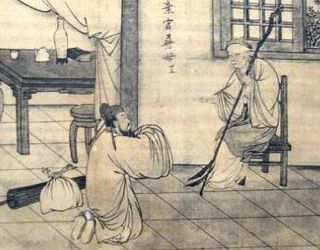 W
WThe Twenty-four Filial Exemplars, also translated as The Twenty-four Paragons of Filial Piety, is a classic text of Confucian filial piety written by Guo Jujing (郭居敬) during the Yuan dynasty (1260–1368). The text was extremely influential in the medieval Far East and was used to teach Confucian moral values.
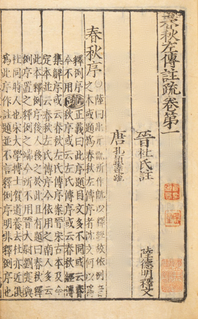 W
WThe Zuo zhuan, generally translated The Zuo Tradition or The Commentary of Zuo, is an ancient Chinese narrative history that is traditionally regarded as a commentary on the ancient Chinese chronicle Spring and Autumn Annals . It comprises 30 chapters covering a period from 722 to 468 BC, and focuses mainly on political, diplomatic, and military affairs from that era. The Zuo zhuan is famous for its "relentlessly realistic" style, and recounts many tense and dramatic episodes, such as battles and fights, royal assassinations and murder of concubines, deception and intrigue, excesses, citizens' oppression and insurgences, and appearances of ghosts and cosmic portents.